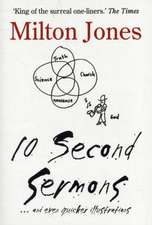Gloryland: Christian Suburbia, Christian Nation
Autor H. B. Cavalcantien Limba Engleză Hardback – 29 oct 2007 – vârsta până la 17 ani
Preț: 363.64 lei
Preț vechi: 478.81 lei
-24% Nou
Puncte Express: 545
Preț estimativ în valută:
69.58€ • 71.79$ • 58.07£
69.58€ • 71.79$ • 58.07£
Carte tipărită la comandă
Livrare economică 26 martie-09 aprilie
Preluare comenzi: 021 569.72.76
Specificații
ISBN-13: 9780313348129
ISBN-10: 031334812X
Pagini: 188
Dimensiuni: 156 x 235 x 20 mm
Greutate: 0.44 kg
Editura: Bloomsbury Publishing
Colecția Praeger
Locul publicării:New York, United States
ISBN-10: 031334812X
Pagini: 188
Dimensiuni: 156 x 235 x 20 mm
Greutate: 0.44 kg
Editura: Bloomsbury Publishing
Colecția Praeger
Locul publicării:New York, United States
Notă biografică
H. B. Cavalcanti is Professor of Sociology and Anthropology at James Madison University. He has published many book chapters and articles in publications such as Journal for the Scientific Study of Religion, Sociology of Religion, Journal of Church and State, and others.
Recenzii
Cavalcanti offers a highly critical view of the changing nature of Christian conservatism in the US..Most levels/libraries.
Cavalcanti contrasts the origins of evangelical Christianity in the rural, poor South to its relatively recent embracing of the upper middle-class values of suburbia. The rise of the non-denominational mega-church within driving distance of every American suburban home is just the most conspicuous example of this change. The author is particularly interested in exploring the political ramifications of this trend..This book is recommended for academic collections that support undergraduate majors and/or graduate programs in the Sociology of Religion.
Cavalcanti contrasts the origins of evangelical Christianity in the rural, poor South to its relatively recent embracing of the upper middle-class values of suburbia. The rise of the non-denominational mega-church within driving distance of every American suburban home is just the most conspicuous example of this change. The author is particularly interested in exploring the political ramifications of this trend..This book is recommended for academic collections that support undergraduate majors and/or graduate programs in the Sociology of Religion.











